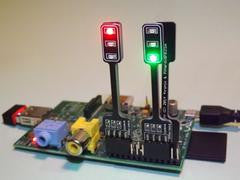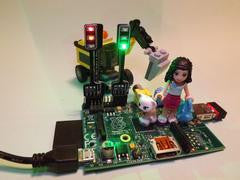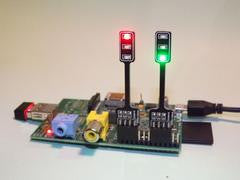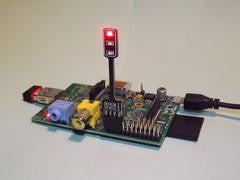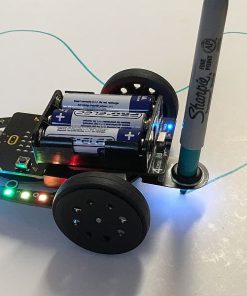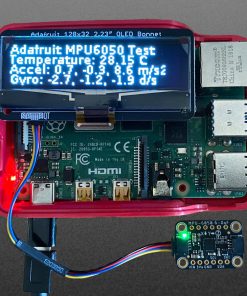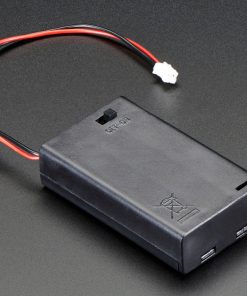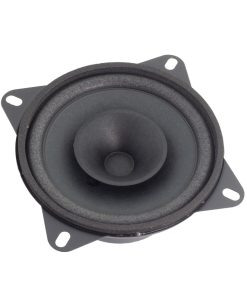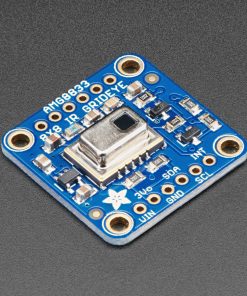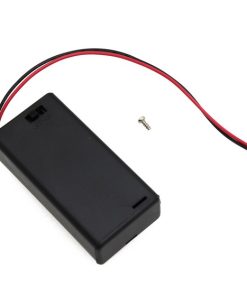The Pi-Stop is a low cost hardware module designed to allow Raspberry Pi users to take their first steps into interfacing with the real world.
Designed with the learning in mind, everyone will recognise and identify its familiar elements encouraging their use along-side their own projects.
See this independent review
Move past the Stop light
The Pi-Stop is designed to remove many of the common hurdles people are faced with when getting started using hardware with the Raspberry Pi. Often it is difficult to know what components to use and how to connect them, the Pi-Stop makes it simple by plugging directly onto pre-set positions on the Raspberry GPIO connector.
By plugging the Pi-Stop directly on to the Raspberry Pi GPIO header, no extra cables or wires are needed. Unlike many other add-on boards, they do not block unused GPIO pins, keeping them open for other uses. The Pi-Stop can be fitted in 4 standard locations, allowing up to four Pi-Stops to be controlled independently or combined with other hardware.
Prepare to go!
The Pi-Stop provides a simple stepping stone, between pure screen based programming and using physical hardware to interact with the real world. Components like the Pi-Stop will provide a flexible and non-restrictive way to build understanding through experimenting.
Since it is only a step away from a bag of components, it also allows the programming of hardware to be introduced, and the electronics involved can be introduced separately, if desired. Allowing the pupils to discover they can control real things, and then again to discover they can also build their own circuits and control them in exactly the same way.
Often, people are faced with a magic board which they plug in and tell it to do stuff, however it isn’t always clear to them why or how it does it. By providing something which they can remove and replace with something (apparently) completely different (- wires, breadboards and LEDs) they will be able to understand the link.
By keeping the hardware very simple, it allows better understanding of what is happening, and allows space to come up with your own projects and apply the concepts with your own ideas in mind.
GO Full throttle
The documentation and guides are openly available for the Pi-Stop for educational use. There will be guides, tutorials and workshop material available all of which can be taken as is[available as PDF format] or adapted to your own needs [available in markdown format].
It is encouraged that similar materials can be submitted back for others also to share and make use of.
The materials will demonstrate the concepts, methods and provide the building blocks to explore ideas and take learning further by with creative projects, activities and games.
NOTE: This item consists of a single Pi-Stop with red, orange, and green surface-mount LEDs. The photos show examples of what can be done by combining multiple Pi-Stops, or using the 4-Pi-Stop Kit.
Pi-Stop Documentation
The following material is available (in both PDF and markdown format):
- Discover: The Pi-Stop: Learn what the Pi-Stop is and how to use it.
- Setup: Scratch GPIO: Get up and running with Scratch GPIO ready to use with the Pi-Stop.(pdf)
- Explore and Challenge Scratch GPIO: Pi-Stop First Steps: If you’ve not used Scratch before, this will provide a quick introduction to building your first Scratch GPIO program. (pdf)
- Explore and Challenge Scratch GPIO: Pi-Stop Traffic Sequence – Create your own traffic light sequence and learn how to use Scratch GPIO with the Pi-Stop. (pdf)
- Explore and Challenge Scratch GPIO: Pi-Stop Reaction Game – How fast are your reflexes? Test your reaction time with the Pi-Stop Reaction game. (pdf)
- Explore and Challenge Scratch GPIO: Pi-Stop Simon Memory Game – Challenge your memory and get the highest score! (pdf)
Fast Shipping and Professional Packaging
Because of our long-standing partnership with UPS, FedEx, DHL and many other leading global carriers, we can provide various shipping options. Our warehouse staff is highly trained and will pack the items according to our exact and precise specifications. Before shipping, your goods will be thoroughly examined and secured. We deliver to thousands of customers every day from all over the world. This is a sign of our dedication to being the largest online retailer worldwide. There are distribution centers as well as warehouses located in Europe as well as the USA.
Note: Orders with more than one product are assigned a specific processing period dependent on the particular item.
Before shipping, we will examine the items ordered carefully before shipping. The majority of orders are shipped within 48 hours. The time to deliver varies from 3-7 days.
Returns
The stock is constantly changing and cannot be fully controlled by us due to the involvement of many parties including the factory and our warehouse. This means that the actual stock could alter at any time. Be aware that it is possible that your order could be out of stock after you have made the order.
Our policy lasts thirty days. If you haven't received your item within 30 days, we're unable to offer the option of a refund or exchange.
You are able to return an item when it's unopened and is in the same condition as when you first received it. It should also be returned in its original packaging.
